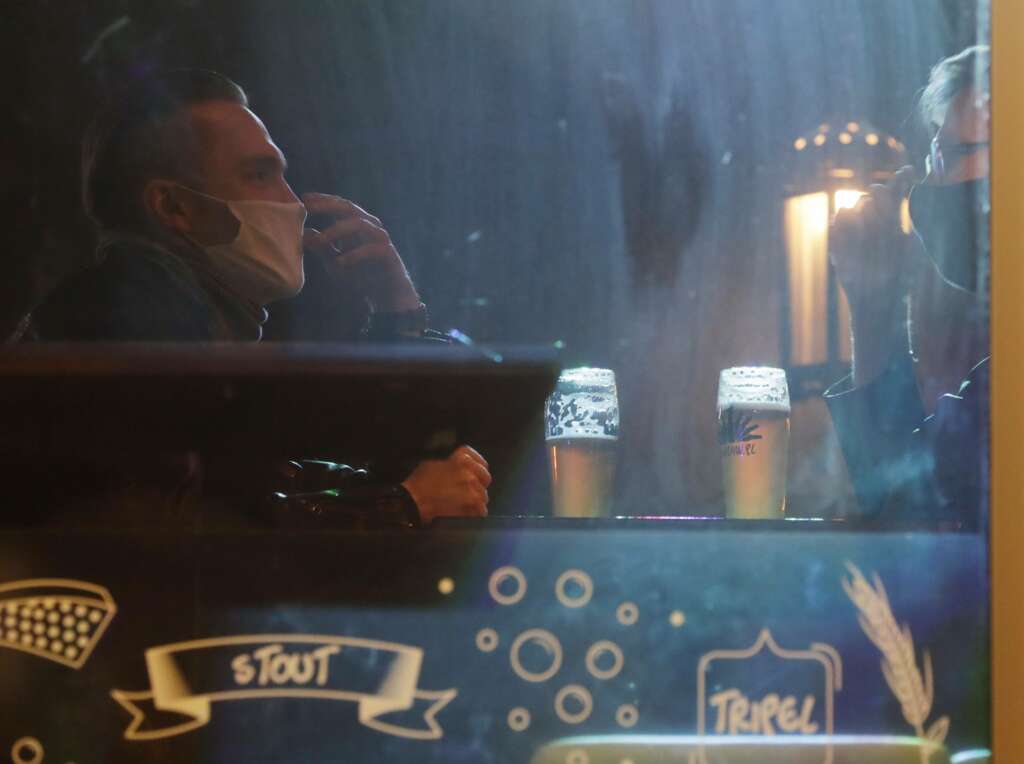
WARSAW, Poland (AP) — The Piw Paw club in Warsaw advertised its event as a “Pandemic Fashion Show,” with models wearing “masks from the Spring 2021 collection.”
But even before the show could start on Friday night, police swept in. They cleared away the few customers and arrested the club owner, who has defiantly kept his doors open despite pandemic restrictions banning the sale of alcohol or indoor dining — and despite earlier police raids and detentions.
A raft of new pandemic restrictions took effect in Poland on Saturday to slow the spread of the coronavirus as central Europe has emerged as a global hot spot. But as the club raid shows, authorities already had problems with people flouting the existing rules.
Piw Paw owner, Michal Maciag, says he is close to bankruptcy. He has used different ruses to try to stay open. Though he said he doesn’t consider the coronavirus worse than other diseases and does not wear a mask, Maciag has declared his bar a “mask factory.” On Friday evening several people were sewing masks in a corner.
Those drinking beer did not “buy” the beer, which is illegal, they asked for a “degustation.” A tip box was set up for those who wished to make a donation.
Maciag’s continued insistence on opening the bar to customers is also motivated by anger with the authorities.
When police swept in on Friday night, a still-maskless Maciag held a beer in his hand and nonchalantly filmed police with his phone. He played a song, over and over, made up of vulgar lyrics directed at Poland’s ruling Law and Justice party as police took people’s details.
“This is all just a performance,” Maciag said of the police raid.
Minutes later, police had forced him outside and into their van.
Poland on Friday marked its third straight record high in new COVID-19 cases — more than 35,000 in one day in the country of 38 million people. To date, the pandemic has taken the lives of more than 51,000 Poles.
As he announced the new restrictions, Prime Minister Mateusz Morawiecki said they would be crucial to saving lives as a new virus mutation first detected in Britain spreads fast. Poland’s strapped health sector is barely coping as it is.
“We are one step away from crossing the border beyond which we will not be able to properly heal patients, heal our citizens,” Morawiecki said Thursday. “We must do everything to avoid such a scenario.”
The restrictions are causing widespread economic pain, however. In a country where people for decades under communism found ways to trick the system to get by, some are again looking for ways to circumvent the rules to maintain income.
Piotr Nowakowski, a personal trainer, found himself out of work when the government closed gyms months ago. He now trains his clients in a small makeshift gym that he arranged on his parking spot in the underground garage of his apartment building.
Sometimes cars, with their noise and exhaust fumes, are a disturbance. But the neighbors haven’t complained. By finding a way to keep working, he has been able to keep supporting his family and paying his bills and loans.
“I really had no choice,” he said. “I had to react quickly. The restrictions came from one day to the next.”
Ksawery Karczewski, a hairdresser, suddenly found himself without income when hair salons were forced to close last spring, including the one where he was employed. They were later allowed to open again but will be forced to close again on Saturday, which prompted a mad last-minute rush to barbers and hair salons on Friday.
After the first shutdown, Karczewski lost his job and switched to making house calls. He also carved out a small space in his apartment where he does his clients’ hair.
An early round of financial help to business owners did not give him much money, and he feels that he cannot count on politicians to ensure help in the future.
“I think they are not thinking about us, more about themselves,” Karczewski said.
Those flouting the rules often believe that it is not themselves, but the politicians and police who are breaking the law. The government introduced the lockdown by government decree, but without a formal state of emergency by parliament.
A prominent Warsaw lawyer, Jacek Dubois, argued that this means that the restrictions themselves are actually illegal under Polish law.
“If these regulations were introduced in accordance with the law and business activity was banned due to the extraordinary situation … the authorities would have to compensate the entrepreneurs at some point,” he said.
The new restrictions taking effect Saturday will last for a two-week period around Easter. They also lower the numbers allowed in churches.
Yet Health Minister Adam Niedzielski noted that even the earlier limits in the churches were not being respected. The Catholic faithful — usually the government’s strongest supporters — are among the rule-breakers, too.
Bishop Ignacy Dec of the Swidnica diocese told the daily Nasz Dziennik this week that he opposed limits on church attendance.
“It is nonsense during an epidemic to close the source of spiritual and physical healing,” he said.
___
Follow AP’s pandemic coverage at https://apnews.com/hub/coronavirus-pandemic, https://apnews.com/hub/coronavirus-vaccine and https://apnews.com/UnderstandingtheOutbreak
Copyright © 2021 . All rights reserved. This website is not intended for users located within the European Economic Area.
